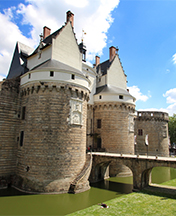The history of Nantes begins with the Namnètes, a Gaul tribe that founded the city in 70 B.C. When Britain was conquered by the Roman Empire, a large number of Britons fled to French Brittany (Bretagne). This is the reason for the many battles fought in the Duchy of Brittany between the Kings of France and the Breton leaders after the death of Charlemagne in 850 A.D. Nantes finally fell in 1488 and in 1532, during the rule of Francis I of France, the Duchy of Brittany was united with the Kingdom of France thanks to queen Claude de France, who gave the Duchy to her husband as a gift. Nantes was also the epicenter of the religious war in France until the signing of the Edict of Nantes in 1598, which brought an end to the troubles between Catholics and Protestants. Many conflicts followed, which persisted well until the 19th and 20th centuries. During the Second World War, Nantes became the center of the French Resistance. The city grew quickly after the war, becoming the first city in France with its own modern tram network. Nantes continues to grow to this day, and is regarded as the most vibrant and attractive city in West France.












